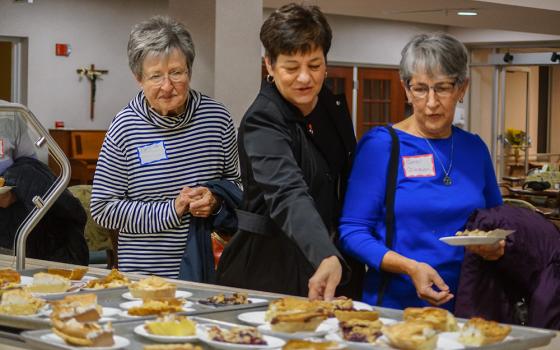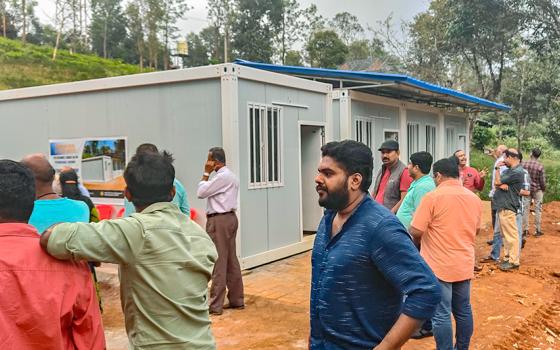
Placed on probation with drug problems and assigned to 30 hours of community service, 17-year-old Darvell was at a loss until a knowledgeable adult persuaded him to join Seattle Youth Garden Works. He ended up completing some 261 hours of service, advancing from crew member to lead gardener.
"I needed to get on the right track. I needed something to help me get out of gang and drug activity," he says.
That something was a program sponsored by the Church Council of Greater Seattle that teaches homeless and at-risk youth how to raise organic crops to sell at local farmers' markets. Darvell says that Seattle Youth Garden Works is more than a job or learning about gardening: "It's not just growing plants, it's helping to grow yourself. It's life-changing."
In the spring, the program's young participants can be found seeding kale, carrots, chard and tomatoes, and rooting the young plants. Though Darvell describes his favorite part as the farmers' markets where he sells the produce, there is also the work on native plants.
During the winter, invasive plants are removed from Seattle's arboretum and replaced with natives like snowberry. Another participant records the experience in her weekly journal: "Today, we helped saving trees. What I mean by saving was that we removed more invasive plants away from the trees." Another writes: "I smell the salt in the water as it moves. I see the cedar as it dies to new growth. I touch a sword fern to find a fiddlehead."
Through the eco-education found at Seattle Youth Garden Works, the lives of couch-surfing or runaway youth are stabilized as they learn about nature within a community that believes in them.
As computer games, the Internet and other such forms of entertainment fill kids' free time, our children lose contact with nature's wonder and joy. They text-message rather than build tree houses. They don't hunt bugs or crawdads, spot animal tracks in the forest and try to figure out who made them, or turn their heads at the song of a red-winged blackbird. They don't discover from experience that all living things exist in relationship, whether in the woods, fields or streams.
In Last Child in the Woods, author Richard Louv uses the term "nature deficit disorder" to describe nature-deprived children. Without the spiritual, emotional and psychological benefits of exposure to the great outdoors, they are at greater risk for depression, obesity and attention problems. Louv's book has stirred "Leave No Child Inside" initiatives that seek to reconnect children with the outdoors through hikes, fishing, camping, field trips and backyard gardens.
 Eco-education and ecotherapy are both applied forms of ecopsychology. Its central tenet? We cannot be healed, or even understood, apart from the entire planet. Social critic Theodore Roszak is generally credited with coining the term in his 1992 book The Voice of the Earth. He decries the diminishment of psychology when it views the human psyche in isolation from its natural environment. Roszak underlines the conviction of indigenous cultures that health means balanced relationships with all living beings. The opposite is considered madness. This is what the shaman or native healer addresses, attempting to restore that vital harmony. Roszak asks: Doesn't the disconnect from nature in our urban industrial society constitute a kind of madness?
Eco-education and ecotherapy are both applied forms of ecopsychology. Its central tenet? We cannot be healed, or even understood, apart from the entire planet. Social critic Theodore Roszak is generally credited with coining the term in his 1992 book The Voice of the Earth. He decries the diminishment of psychology when it views the human psyche in isolation from its natural environment. Roszak underlines the conviction of indigenous cultures that health means balanced relationships with all living beings. The opposite is considered madness. This is what the shaman or native healer addresses, attempting to restore that vital harmony. Roszak asks: Doesn't the disconnect from nature in our urban industrial society constitute a kind of madness?
One aspect of ecopsychology is reflection on how best to galvanize action to save our endangered planet. Early attempts to do this used guilt, fear and shame. But too much of this leads to despair and paralysis. How can we move through the emotions that keep us from acting on ecological issues? How can we help people in consumer cultures understand the nature of their deepest desires and find the path to the happiness they seek?
Wellness on a dying planet
Joanna Macy, a well-known leader of workshops on moving from despair to personal empowerment, helps participants grieve the stately trees, the magnificent birds and the beautiful landscapes we are losing. She helps them feel and express their rage over threats to the Earth and their guilt at being implicated in this catastrophe. Macy and John Seed, an Australian environmental activist, have created the Council of All Beings, a series of re-earthing rituals to help us find the joy, inspiration and commitment that come from union with nature. These exercises involve breath work, meditation, song, dance, drama and communal participation.
Re-earthing is a way to hear the Earth's voice and seek guidance from the countless species with which we share the planet. We can, for example, embrace the Earth story as our own creation myth. We awaken to the fact that each cell in our bodies emerges in an unbroken chain from the very first cell on the Earth.
What kinds of psychotherapy emerge when we view clinical symptoms as signals that something is awry in our relationship with the larger universe? The evolution of the field of psychotherapy itself is instructive here. It runs parallel with the evolution of our self-consciousness. Freud and Jung broke ground as keen students of our unconscious minds, our inner conflicts and the archetypes that live in the psyche.
 Then social psychologists like Karen Horney and Harry Stack Sullivan tapped them on the shoulder. "This is all very helpful, but aren't we inherently social beings? Your focus is too narrow. We cannot understand ourselves in isolation, but only in relationship with others." Family therapists then made particular application of this principle, showing how psychopathology in one family member is only the most conspicuous manifestation of a dysfunctional family system, extending horizontally across the present family and vertically back to previous generations.
Then social psychologists like Karen Horney and Harry Stack Sullivan tapped them on the shoulder. "This is all very helpful, but aren't we inherently social beings? Your focus is too narrow. We cannot understand ourselves in isolation, but only in relationship with others." Family therapists then made particular application of this principle, showing how psychopathology in one family member is only the most conspicuous manifestation of a dysfunctional family system, extending horizontally across the present family and vertically back to previous generations.
Today ecopsychologists are widening the lens still further to take in the whole of nature, because we are all just as thoroughly embedded in nature as we are in family and other social networks. If our planet is indeed dying, how can we be well? Until we address the condition of our entire ecosystem, how can we possibly thrive?
This might all seem quite poetic but impractical when you are listening to someone struggle with depression or anxiety. Much psychotherapy seems to assume that we are separate selves, and that our proper focus is our own well-being. Therapy happens in an office where individuals probe their life stories, inner feelings and personal relationships for clues to their distress. Few would see the polluted air and streams in their neighborhoods, or the congested freeways they just traversed, as implicated in their problems.
But when the larger system sickens, we feel it at levels we cannot always articulate. Some of our clients express this when they tell us their personal lives seem to be going well enough, but that they carry a disturbing sadness and anxiety about the larger world. Recognizing this is the crucial first step. Grief and a desire to act frequently follow.
With a keen sense that nature has much to teach us, psychotherapist Milton Erickson, counseling in Arizona, would often send his clients into the wild on assignment. "Get up tomorrow morning at 6," he would say, "and start climbing up Squaw Mountain. At about 7 o'clock, you will notice something that will shed light on your problem." Or he would send them to a botanical garden and have them sit for 30 minutes contemplating the cactuses. His clients would go out baffled and come back to tell of remarkable discoveries. At the very least, they would get perspective back. And they would never look at nature again in the careless way they had.
Once we counseled a man who was often at odds not only with his wife but with his children as well. He had told us that one of his favorite ways of "getting away from it all" was to climb in his speedboat and "really turn it up" on a large lake near his home. What possible good could this do him? It was nothing more than the freeway experience on water. He dared not look at anything but what was directly in front of him. He could not hear anything but the roar of his motor.
We gave him an assignment. Next time he needed to get away from it all, he was to get in a canoe and paddle around the shore of the lake, then come back and tell us what he saw and heard. He heard the lapping of his paddles in the quiet water. He marveled at the stillness. Looking down into the blue-green lake, he spotted plants and fish. He noticed mallards and a swan floating on the surface with him. He watched the swoop of shore birds and heard their distinctive calls. He rocked on the gentle waves and marveled at the blue sky overhead with its patchwork of clouds. He went home refreshed and renewed, and his family, and all of nature, breathed a sigh of relief.
Ecotherapy also involves giving back to the Earth by cleaning up beaches, planting trees or restoring habitats. The restoration of nature might even lead to closer relationships with one another. Those who go out on weekends to pick up trash from roadsides, neighborhoods and streams feel a rare sense of solidarity and make new friends.
When we solicited volunteers from our condominium building next to the habitat we restored, we did not anticipate the human healing that happened. Those struggling with loneliness found a community experience. A blind resident learned that his skills at preparing the soil for the plants were highly valued. Those who hardly knew one another got acquainted as they worked. In the months and years that followed they felt not only a connection with one another, but also with that small piece of nature outside their windows as they observed the arrival of ducks and butterflies and the blossoming of Oregon grape and mock orange. When we come together to mend our neglected relationships with backyard trees or plots of land near home, we heal both the Earth and our own souls.
Kathleen Fischer and Thomas Hart teach theology and do counseling in the Seattle area. Fischer is author of Winter Grace: Spirituality and Aging. Hart is author of Christian Listening.



